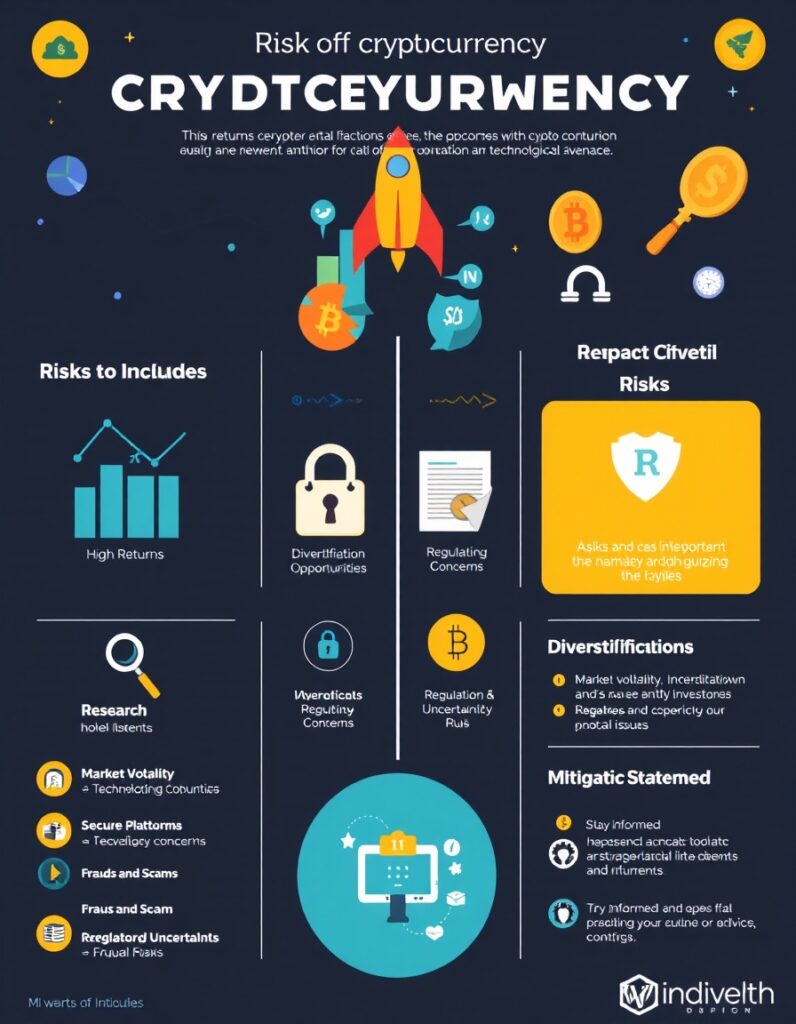Cryptocurrency has rapidly evolved from a niche technology to a mainstream financial asset, attracting investors seeking high returns and innovative financial solutions. However, with its potential rewards come significant risks. Understanding both the benefits and hazards of cryptocurrency is crucial for making informed investment decisions and navigating this dynamic market effectively.
1. The Rewards of Cryptocurrency
1.1. High Potential Returns
- Market Volatility: Cryptocurrencies are known for their price volatility, which can lead to substantial gains in a short period. For instance, Bitcoin and Ethereum have seen significant increases in value over the past decade.
- Early Adoption Benefits: Investing early in emerging cryptocurrencies or blockchain projects can offer high returns if the technology gains mainstream adoption.
1.2. Diversification of Investment Portfolio
- Alternative Asset Class: Cryptocurrencies provide an alternative to traditional investments like stocks and bonds, allowing for diversification and potential hedging against market downturns.
- Global Accessibility: Cryptocurrencies can be accessed and traded globally, offering investors opportunities in markets that may be otherwise inaccessible.
1.3. Technological Innovation
- Blockchain Technology: Beyond financial transactions, blockchain technology underpins numerous innovative applications, from decentralized finance (DeFi) to non-fungible tokens (NFTs). Investing in cryptocurrencies allows participation in cutting-edge technology developments.
- Smart Contracts: Platforms like Ethereum enable smart contracts, which automate and enforce contractual agreements without intermediaries, providing opportunities for novel business models and efficiencies.
2. The Risks of Cryptocurrency
2.1. Market Volatility and Speculation
- Price Fluctuations: Cryptocurrency prices can experience extreme fluctuations, driven by market speculation, news events, and regulatory changes. This volatility can result in significant losses, especially for short-term investors.
- Lack of Regulation: The relatively unregulated nature of cryptocurrencies compared to traditional financial assets means that market behavior can be unpredictable and influenced by speculation rather than fundamentals.
2.2. Security Concerns
- Cybersecurity Threats: Cryptocurrency exchanges and wallets are targets for hacking and cyberattacks. Investors must take precautions to secure their assets and avoid falling victim to theft or fraud.
- Loss of Private Keys: Cryptocurrencies are stored in digital wallets that require private keys. Losing access to these keys means losing access to your funds permanently.
2.3. Regulatory and Legal Risks
- Regulatory Uncertainty: Cryptocurrency regulations vary by country and are evolving rapidly. Changes in regulatory policies can impact the value and legality of cryptocurrencies, leading to potential legal and financial risks.
- Tax Implications: Cryptocurrency transactions may be subject to complex tax regulations, including capital gains taxes and reporting requirements, which can create additional financial burdens.
2.4. Project Viability and Scams
- Rug Pulls and Fraudulent Projects: The cryptocurrency space has seen numerous scams, including projects that mislead investors or disappear with funds. Due diligence is essential to avoid investing in fraudulent schemes.
- Lack of Due Diligence: Many cryptocurrency projects lack transparency and clear business models. Investors should thoroughly research and assess the viability of projects before committing funds.
3. How to Mitigate Cryptocurrency Risks
3.1. Conduct Thorough Research
- Project Fundamentals: Evaluate the technology, team, and use case of a cryptocurrency project. Assess the whitepaper, development activity, and community support.
- Market Analysis: Study market trends, historical performance, and competitive positioning to make informed investment decisions.
3.2. Use Secure Platforms
- Choose Reputable Exchanges: Select cryptocurrency exchanges with strong security measures and a good track record. Look for exchanges with insurance coverage and regulatory compliance.
- Implement Security Measures: Use hardware wallets for storing cryptocurrencies and enable two-factor authentication (2FA) on accounts to enhance security.
3.3. Diversify Investments
- Avoid Overconcentration: Spread investments across multiple cryptocurrencies and other asset classes to reduce risk and avoid overexposure to any single asset.
- Consider Stablecoins: Incorporate stablecoins or low-volatility assets to provide stability within your cryptocurrency portfolio.
3.4. Stay Informed and Adapt
- Monitor Market Developments: Keep up with news and regulatory changes in the cryptocurrency space to stay informed about potential impacts on your investments.
- Adapt Strategies: Be prepared to adjust your investment strategy based on market conditions, project developments, and changes in regulatory environments

